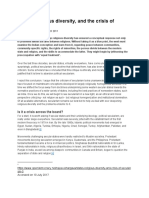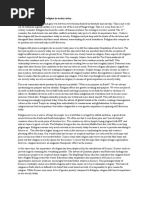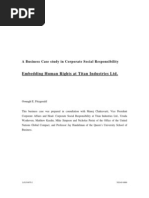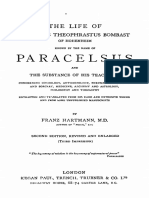0 ratings0% found this document useful (0 votes)
79 viewsReligion Does More Harm Than Good
Religion Does More Harm Than Good
Uploaded by
Cai Peng FeiThe document discusses whether religion does more harm or good. Those arguing religion does more harm claim that religious organizations tend to oppose social reforms and promote divisions in society. They also argue that religious texts are often used to justify sexism, racism, and homophobia. However, others counter that religious organizations are major providers of charity worldwide and have historically been important in education and healthcare. They also argue that religion promotes moral values and spiritualism in public life beyond just economic concerns.
Copyright:
© All Rights Reserved
Available Formats
Download as DOCX, PDF, TXT or read online from Scribd
Religion Does More Harm Than Good
Religion Does More Harm Than Good
Uploaded by
Cai Peng Fei0 ratings0% found this document useful (0 votes)
79 views11 pagesThe document discusses whether religion does more harm or good. Those arguing religion does more harm claim that religious organizations tend to oppose social reforms and promote divisions in society. They also argue that religious texts are often used to justify sexism, racism, and homophobia. However, others counter that religious organizations are major providers of charity worldwide and have historically been important in education and healthcare. They also argue that religion promotes moral values and spiritualism in public life beyond just economic concerns.
Original Description:
Debate
Original Title
Debate Arguments
Copyright
© © All Rights Reserved
Available Formats
DOCX, PDF, TXT or read online from Scribd
Share this document
Did you find this document useful?
Is this content inappropriate?
The document discusses whether religion does more harm or good. Those arguing religion does more harm claim that religious organizations tend to oppose social reforms and promote divisions in society. They also argue that religious texts are often used to justify sexism, racism, and homophobia. However, others counter that religious organizations are major providers of charity worldwide and have historically been important in education and healthcare. They also argue that religion promotes moral values and spiritualism in public life beyond just economic concerns.
Copyright:
© All Rights Reserved
Available Formats
Download as DOCX, PDF, TXT or read online from Scribd
Download as docx, pdf, or txt
0 ratings0% found this document useful (0 votes)
79 views11 pagesReligion Does More Harm Than Good
Religion Does More Harm Than Good
Uploaded by
Cai Peng FeiThe document discusses whether religion does more harm or good. Those arguing religion does more harm claim that religious organizations tend to oppose social reforms and promote divisions in society. They also argue that religious texts are often used to justify sexism, racism, and homophobia. However, others counter that religious organizations are major providers of charity worldwide and have historically been important in education and healthcare. They also argue that religion promotes moral values and spiritualism in public life beyond just economic concerns.
Copyright:
© All Rights Reserved
Available Formats
Download as DOCX, PDF, TXT or read online from Scribd
Download as docx, pdf, or txt
You are on page 1of 11
1. Religion does more harm than good.
For: Religion does more harm than good
Religious organisations tend to act as a reactionary pull on wider society opposing egalitarian
reforms and developments
It is a basic tenant of all religions that they divide
humanity into us and them believers and
non-believers. However, the divisions of society
perceived by religious believers do not stop
there, and have a tendency to reflect the social
and moral views of an earlier and far less
progressive age.
As well as condemning those who practice other
faiths, or who choose to follow no faith, they
have fought, and continued to fight, the
expansion of the rights of women and of socially
marginalised castes, among other social groups.
All of the major churches and sects have had to
be dragged kicking and screaming into the
modern world, and most of them are still
desperately trying to ignore the existence of
modernity. While justifying their political and
moral positions through obtuse and deliberately
obscure interpretations of religious texts,
obscure texts even the mainstream
interpretations of major religions are usually
sexist, frequently racist and almost universally
homophobic.
Preventing access to contraception is the single
largest block to women getting out of poverty.
There are many other examples of the excesses
and double standards of mainstream religion
too many examples to pick one.
All of the major religions teach respect for others
regardless of whether people agree with their
lifestyle or beliefs. Thats a huge advance on
much of secular thought quite without the help
of religious organisations, prejudice exists within
the worlds of business, politics and science. It
seems a little unfair to single out one area of life.
At least religious organisations are based on the
belief that everybody should be treated with
respect, which is not a claim that could be made
be most political creeds.
In addition there are few social changes that
have not involved religious radicals at their
foundation. Rightly or wrongly, major religious
organisations tend to reflect the views of the
societies of which they are a part. It seems unfair
to blame the religious organisations for that.
It is also worth distinguishing between nations
where one religious belief is wide-spread and
almost normative in nature, and those where it
is far more of a choice. If women or homosexuals
chose to join a church in a pluralist society,
presumably they are not expecting to be a priest.
Because religion combines dogmatic certainty with the existence of the afterlife, violence and
death is all too easy to justify
Particularly in the case of contemporary Islam,
although other historical examples could be
referred to, the combination of certainty and the
promise of life after death is a sure route
towards violence. That said, Catholics and
Protestants in Northern Ireland demonstrated
Many people have been keen to wrap
themselves in the trappings of religion just as
they do in the flag or in the rhetoric of one
political ideology or another.
Seeking to associate ones opinions with one
creed or another is the oldest trick in the
this until recently; the Yugoslav wars between
Catholics, Orthodox and Muslims, both sides of
the battle for Israel/Palestine and many others in
history could also be thrown into the mix.
Allowing people the opportunity to claim that
Gods on our side can be used to justify
anything, especially when He appears to be
fighting on both sides.
ideologues book.
The fact that men of violence claim to be doing
things in the name of peaceful religions tells us
very little about the religions themselves. In the
modern world they is no reputable religious
leader doing so and those minority leaders who
attempt to are generally condemned and
ostracized by the principle leaders of their faiths.
Laying responsibility for violence at the foot of
religion as a whole gives credibility to a handful
of extremists in much the same way that
conflating patriotism and fascism would.
Regardless of the protestations of some there is no major religion that has not been involved in
persecuting non-believers at some point in its history and most still are
Although in much of the world the days of the
crusades and the inquisition may be gone, there
are plenty of nations were religious disobedience
still is still punished harshly, summarily or extra-
judicially. In other countries, semi-official militias
are left to enforce the minutiae of religious law,
although usually in such a way as to
disadvantage women and others already
persecuted in society.
It should be noted that what tends to be the
focus of such persecution is a lack of adherence
to an ultra-orthodox position. It is frequently a
cover for political or social prejudice. Charges of
heresy or apostasy are easy to level and nigh on
impossible to disprove.
Even beyond these extremes, demands for
religious observance play out in US elections
and, inexplicably, the views of religious leaders
are sought on areas where they really have no
relevant expertise at all, such as advances in
medical progress. Those who disagree on
matters such as stem cell research or gay rights
are, apparently, arguing with the Almighty.
Secularism is a peculiarly Western European
concern. In most of the world religious
observance is taken very seriously. Denying
people access to the guidance of religious
leaders flies in the face of allowing people
freedom of choice and conscience.
Secularists routinely, and somewhat arrogantly,
insist that their voices must be heard but those
of people of faith, despite representing the
overwhelming view of humanity, should be
silenced.
Equally where there are religious precepts
incorporated within the law. One of the oldest
systems of secular, state arbitrated law- the
common law of England- is based largely on
religious principles. For secularists to attack
religious people for criticizing difference, when
all they are really saying is that most people
arent secularists, is the height of hypocrisy.
Most of the world takes religious observance
very seriously and expect their beliefs to be
respected by their international political leaders
and others.
Against: Religion does more good than harm
Religious organisations are by far the largest providers of charity in the world
Whether sending food support in famine zones,
providing education, hospices or a vast range of
other charitable activities, religious organisations
are streets ahead. In addition they frequently are
the only organisations willing to go into certain
high risk areas throughout the world.
Religious education frequently has more to do
with indoctrination than anything else, as is seen
in so-called schools where reciting the Koran or
Talmud passes for education or in privately
funded education in the UK and US where
evolution is taught as just another theory.
In addition in many sociogeographic areas,
especially those of urban poverty, priests may be
the only professional that many hundreds of
people can access. Churches and mosques are
frequently the only place of sanctuary and
peace.
In addition religious organisations have
historically been the first to provide education
and healthcare with nation states following their
example.
In terms of tackling poverty, there is no doubt
that many religious organisations- especially the
Catholic Church- provide enormous quantities of
relief to the poverty directly caused by their
policies in the first place.
No single cause of poverty, especially among
women, is greater than denying women access
to contraception, closely followed by denying
them access to education. As the woman is
frequently the primary care giver, their poverty
affects their children.
Religious organisations remind societies and the world that there are other important things in life
beyond economics and that moral and other concerns should be taken into account in public life
In a world consumed by the belief that the only
thing in life that genuinely matters is money,
religious bodies serve as a welcome reminder
that other activities- besides wealth creation-
can be meaningful and valuable too. In addition
to promoting morality and spirituality within
society they have also, historically, been
sponsors of great art and music.
The fact that religions are also international
organisations bring perspectives that believers in
some countries may find uncomfortable, but
which act as a reminder of more universal truths
primarily, altruism.
The simple reality is that religious organisations
in most of the world are all too willing to involve
themselves in ecumenical politics and issue
declarations on economic matters. Equally,
presenting the absurd and grotesque wealth and
power of the worlds major religions as having
anything to do with quiet spiritualism is, frankly,
absurd.
In some circumstances, major religions can
provide international perspective but, all too
often, that simply means importing the most
reactionary position available African Anglicans
on gay ordination in the US; the mediaeval views
from Islam in the Middle East into discussions on
the rights of women in European migrant
communities. Generally this brand of
internationalism simply reopens social battles
that were settled a century and more ago in the
West.
Religious ceremonies and organisations provide solace and celebration for the great changes in life
such as birth, marriage and death, there is democratic support for this around the world
At times of great need or celebration, religious
communities and organisations are often the
only organisations that seem fit to the task of
marking them.
This principle applies both in peoples own lives,
with the birth of a child or the death of a loved
one, but it can also apply to national events. At
times of great tragedy it is frequently the main
religious community that is expected to sum up
the mood of a nation and to provide explanation
and succour. It is difficult to see how a politician,
jurist or academic could fulfill that role so well.
It is interesting that although we may ignore the
It is an interesting defence of a position to note
that people only really turn to it when they are
emotionally vulnerable and their mental faculties
are at their weakest. Its scarcely a clarion
defence of the benefits or religious observance
or practice.
It is no doubt true that when we need an
explanation for the apparently inexplicable- the
death of a child, say- there is more comfort to be
found in the ministrations of a cleric than that of
a statistician. However that in no way makes the
cleric, or their creed, right.
The cold hard truth is that personal and national
day-to-day role of religion in society and in
communities, at moments of great trial, or great
celebration, it is to religious rites that most
people turn.
tragedies do have logical explanations, it just
happens that we may not want to hear them at
the time. However, any other credo which used
other peoples emotional weaknesses to push
their view of the world and the universe would
be treated with contempt. For some reason,
religion gets a pass.
2. Animals have rights.
For: Animals have rights.
Animals are intrinsically worthy of rights because they are sentient
Sentience is the property of being
conscious. Sentience brings with it the ability to
experience. There is a massive difference in the
way that we treat sentient and non-sentient
beings instinctively.
We see nothing wrong with forming
relationships with ones pets but we tend to
deem people with emotional relationships to
objects mentally ill. Here we are talking about
something more than sentimentality but rather
the kind of relationship in which one is
concerned with the other partys emotional
wellbeing.
We even feel concerned about the wellbeing of
sentient beings which whom we do not have a
personal connection. For example we may feel
upset when we see a dog run over on the road.
This would be a very difficult reaction to how we
might feel if we see an object crushed by a car.
We feel moral outrage at the clubbing of seals.
The instinctive way which we differentiate
between these two categories relates to the type
of value they have. Whilst objects have value
because of how they affect us - e.g. they are
useful or remind us of a good time or person
we believe that animals have intrinsic value.
This means that a sentient being must never be
treated as a means rather than an end in and of
itself. Animals are sentient. Therefore, animals
must not be treated as a means to an end but as
intrinsically valuable.
First off, you are appealing to instincts which not
everyone has. People who work on farms are
happy to slaughter animals. A lot of people do
not own pets simply because they do not feel
any affection towards animals and care more for
material objects. Many people do not care about
the clubbing of seals. It is human beings of
course who perform these clubbing, murder
sharks, poach etc. Furthermore, it is irrational
that people care about their pets because cows
are equally as sentient as animals yet people are
happy to eat veal and battery farmed beef and
clearly do not care about the cow.
People treat pets as property. They buy and sell
them, put them down when they contract
illnesses that are too expensive to treat, give
them away when they move houses etc.
These are things that they certainly wouldnt do
to human beings. If you want to argue according
to what humans do instinctively then we
instinctively value humans more than animals
and are happy to eat and kill animals.
Furthermore, we do not think that using a
descriptive claim- what humans feel
instinctively- means that you can then make a
prescriptive claim that all sentient beings
deserve equal consideration.
In many ways we treat other human beings as
only extrinsically valuable. Neo-Malthusians
believe we should allow the poor to die of
hunger to ensure that the current population
does not suffer from the scarcity that arises from
overpopulation. Many wars have involved killing
lots of people to achieve political aims.
Therefore, we often treat humans as extrinsically
valuable.
Speciesism is wrong
Just as racism is wrongful discrimination against
beings of a different race and sexism is wrongful
discrimination against a being of a different
gender, speciesism is wrongful discrimination
against a being of a different species. Wrongful
discrimination occurs when there is no other
reason for the discrimination except the mere
fact that the being is of the race, sex, or species
that they are. For example, if an employer
refuses to employ a black woman over a white
woman because she has an inferior qualification
this is justified discrimination whereas if he
refuses to employ the black woman simply
because she is black then this is wrongful
discrimination. Human beings are speciesist
towards animals because we sacrifice their most
important needs for our trivial desires: their life
for our enjoyment of a burger.
You might think that we are allowed to have
special relationships to people that are similar to
us but there is a difference between special
relationships and being active cruel and
discriminatory. Our evolutionary instinct to
protect our own species may not be ethically
correct in contemporary society.
Similarly, we ought not to 'put down' animals
who are too expensive to care for. We do not
allow human beings to kill off their children
when they experience financial difficulty because
we believe that human beings value their lives. It
would be justifiable to kill off something that has
no interest in living, such as a plant, but since we
believe that animals do have an interest in living
it would be speciesist to kill off a puppy simply
because it is not human. We know that society
believes animals have an interest in living
sometimes because there is outcry when baby
seals are clubbed or when elephants are
poached for their ivory. Yet at other times we
are happy to eat animal flesh and wear leather.
This is a contradictory stance. We ought to be
consistent in our views and to condemn
speciesists.
Refusing animals rights is speciesist. Speciesism
is wrong. Therefore, it is wrong to deny animals
We agree that speciesism is wrong but we do not
think that refusing animals rights is speciesist
because there are relevant moral differences
between animals and humans.
Or: There is nothing wrong with speciesism. It is
natural to value the lives of one's own species
more than those of another species because we
are programmed that way by evolution. We are
expected to care more about our own families
than about strangers and similarly to value the
lives of our own species more than those of
animals. It is only natural and right that if we had
to choose between a human baby and a dog
being killed we should choose the baby.
rights.
Animals are equal to human beings.
It is true that animals and human beings are
different. It is also true that men are different
from women and children from adults. Equality
does not require beings to be identical. It is true
that whilst many people argue women should
have the right to abortion, no one argues the
same for men because men are unable to have
an abortion. It is similarly true that whilst most
people believe all human beings have a right to
vote, no one argues that animals deserve a right
to vote even those who support animal rights.
Equality does not mean that beings all deserve
the exact same treatment. It means rather that
we consider equally the equal interests of
animals and humans. If we deem amount A to be
the maximum amount of suffering a person be
allowed to endure, then that should apply
equally to an animal, though humans and
animals may suffer different amounts under
different circumstances.
The principle of equality advocates equal
consideration, so it still allows for different
treatment and different rights. Equality is a
prescriptive rather than a descriptive concept.
Whats important is that beings should ONLY be
treated differently where there is a morally
relevant difference between them. For example,
we can justifiably deny dogs the right to vote
because there is a relevant difference in
intelligence between dogs and humans.
However, there is no justification for battery-
farming chickens who have a capacity to suffer.
There is evidence that they experience fear, pain
and discomfort. Although chickens may be less
intelligent and unable to speak , these
differences are not morally relevant to whether
or not they should be placed in these conditions.
We ought to consider animals equally to the way
we consider humans. If we were to do so we
would give animals rights. We ought therefore to
give animals rights.
Equality requires that two beings are actually
equal on some fundamental level. Human beings
have certain essential similarities that make
them equal. These do not stretch to animals.
Human beings are able to distinguish right from
wrong while animals have no notion of ethics.
We are thus able to consider what kind of a
society we want to live in and we are affected
when we feel that there is social degradation.
Animals, however, do not have this sense. We
have fundamental dignity which animals do not.
This is clear in the fact that animals do not
experience shame or embarrassment, desire
respect, or have a notion of self. Furthermore,
human beings can consider their future and have
particular desires about how they want their life
to play out. These are different for every
individual. This is why we are concerned with
choice and protecting individualism and religion.
Animals on the other hand are concerned only
with immediate survival. They have only
instincts, not individual desires and wants.
For these reasons, we can't consider animals to
be equally morally considerable. As for the
propositions standard of relevance for the
criteria which distinguish animals from humans
in any given case, we would argue that the
fundamental individuality and humanity of our
species is relevant in every case because it
makes animal life fundamentally less valuable.
Even if it matters whether or not humans and animals are similar, humans and animals are in fact
similar enough that both should be granted rights.
We have already noted that beings do not need
to be similar in order to be equally morally
Even if animals are able categorize images in
photographs and learn sign language, they are
considerable. Assuming but not conceding that
this is false, we will prove that animals are in fact
incredibly similar to human beings, so much so
that we should grant them rights.
First of all, animals have an equal capacity to
experience pain. While we are unable to know
exactly what other humans or animals are
experiencing, we can make inference from what
we observe. According to Peter Singer: Nearly
all the signs that lead us to infer pain in other
humans can be seen in other species...The
behavioural signs include writhing, facial
contortions, moaning, yelping or other forms of
calling, attempts to avoid the source of pain,
appearance of fear at the prospect of its
repetition, and so on.
In addition we know that animals have nervous
systems very like ours, which respond
physiologically as ours do when the animal is in a
circumstance in which we would feel painan
initial rise of blood pressure, dilated pupils,
perspiration, an increased pulse rate, and, if the
stimulus continues, a fall in blood pressure.
Although human beings have a more developed
cerebral cortex than other animals, this part of
the brain is concerned with thinking functions
rather than basic impulses, emotions, and
feelings. These impulses, emotions, and feelings
are located in the diencephalon, which is well
developed in many other species of animals,
especially mammals and birds. Animals
therefore have the capacity for physical and
emotional suffering, and so should be granted
rights.
still phenomenally less intelligent than human
beings. They will never study philosophy or
perform brain surgery or even invent a wheel.
Furthermore, intelligence does not prove the
ability to self-actualise. Mourning others does
not prove that animals value their own lives.
Perhaps it implies that animals enjoy company
but whether they consider the value of their
companion's life and their future potential is
questionable. Without the ability to value one's
own life, life itself ceases to be intrinsically
valuable.
The farming of animals does involve death but it
is difficult to prove that death is intrinsically a
harmful thing. Pain is certainly a harm for the
living but animals are farmed are killed very
quickly and they are stunned beforehand.
Animals on farms do not know that they will be
killed so there is no emotional harm caused by
the anticipation of death.
There is no evidence that the painless killing of
animals should carry any moral weight.
Even if we did think that animals were less intelligent than humans beings they should be
protected by rights
Babies and individuals with learning disabilities
may lack intelligence, a sense of justice and the
ability to conceive of their future. We ensure
that babies and the learning disabled are
protected by rights and therefore these factors
cannot be criteria by which to exclude a being
from the rights system. Therefore, even if
animals are not as advanced as human beings
they should be protected by rights. An inability
to know what's going on might make being
experimented on etc even more frightening and
damaging for an animal that it may be for a
human being.
We do not analyse human beings on a case by
case basis but rather by what distinguishes
human beings as a whole, as a species. Infants
have the potential to become rational and
autonomous etc. The profoundly retarded
represent flawed human beings. Retardation is
not a human characteristic just as being 3-legged
is not a characteristic of a dog though there are
both retarded humans and 3-legged dogs.
Against: Animals should not be granted rights.
We are at the top of the animal hierarchy and should treat other animals accordingly in order to
further our own species.
We have always been superior to animals. Just as
a lion can kill antelope and a frog can kill insects,
so too human beings have struggled their way to
the top of the food chain. Why then can we not
exercise the power we have earned? Animals
exercise their power and we should do the same.
It is our natural obligation to do so.
The reason we have always killed animals is
because we need them. We need meat to be
healthy and we need to test medicines on
animals to protect our own race. We use animals
to further our own race. This too is surely a
natural obligation.
We are morally responsible creatures and we
can survive perfectly well without being cruel to
animals. Animals are different because they
need to hunt to survive and are not morally
responsible. The interests they satisfy by being
cruel to other animals (namely the need to eat)
are momentous whereas the human need to
wear a fur coat or have a tasty burger instead of
a vegetarian pasta dish is trivial.
Animals are not moral agents
It makes no sense to give animals rights because
they cannot makes decisions about what is right
and wrong and will not try to treat us in an
ethical manner in return. Why make them a
moral agent by giving them rights?
There is a different between being morally
responsible and being morally considerable.
Human beings are both. Moral responsibility
implies a duty and therefore a capability to act in
an ethical manner. Animals can not of course be
morally responsible as they do not have the
intellectual capacity to ascertain what is right
and wrong, only instincts as to how to survive.
We cannot expect animals to be morally
responsible but this does not mean that human
beings do not have a duty to be morally
responsible. It would be ideal for all beings to act
in an ethical manner but only humans are
capable of considering ethics and therefore we
are the only morally responsible beings. Moral
considerability refers to whether or not a being
deserves to be treated in an ethical manner.
There is a burden on the proposition to show
why moral considerability relies on being morally
responsible. Profoundly retarded human beings
and babies are unable to be morally responsible
and yet we consider them to be morally
considerable.
We only have indirect duties to animals
Philosophers such as Immanuel Kant argue that
we only have indirect duties towards animals.
This means that we may not treat animals in
such a manner that our actions are in conflict
with our duties towards human beings. A human
has no duty towards a dog not to kick it but a
human has a duty towards the dog's owner not
to damage his property. Pigs and cows are not
loved by any human being so we cause no harm
when we kill and eat them. Though the farmer
may have owned the cow before, the beef
becomes our possession when we purchase it.
Wild animals are not owned by any human being
so we may do to them what we wish.
Some people argue that cruelty towards animals
can lead to cruelty towards humans but there is
no evidence that people who work in
slaughterhouses are more violent towards other
people. In fact, there seems little connection at
all between how people treat animals and
humans. A slave driver may adore and pamper
his dog but beat and kill his slaves.
If we have no direct duties to animals how can
we grant them legal protection in the form of
rights? The law should only prevent us harming
animals when that clearly harms other people.
For example, by killing a dog we infringe another
person's human right to property.
We clearly have direct duties to animals if we
condemn the clubbing of baby seals and like
activities. Furthermore, it is not enough simply
to state what duties we do and don't have. There
needs to be a reason why we do not have direct
duties to animals. What distinguishes them from
human beings that might answer this question?
We would argue that there is nothing. Animals
unlike other 'property' can suffer and feel pain
and have an interest in living.
Animals have no interests or rationality
Some philosophers argue that only beings that
are able to make rational choices can have moral
rights because the function of rights is to protect
choice. Animals are not able to make rational
choices because they can only follow instinct,
they cannot follow logic.
Some philosophers believe that the function of
rights is to protect interests. An argument from
R.G. Frey argues that animals do not have
interests because they do not have language. In
order to desire something one must believe that
one does not currently have that something and
therefore believe that the statement I have x is
false. One cannot have such a belief unless one
knows how language connects to the world.
Animals cant talk so they certainly are unable to
know what it is that the sentence I have x
means in the real world. Therefore animals
cannot have desires. Without desires animals
cannot have interests. If the function of rights is
If only rational beings should be protected by
rights then we should not protect babies or
profoundly retarded people; but this is absurd.
Animals do make choices according to their
preferences e.g. lions choose a mate and dogs
choose a spot to lie in the sun One is able to
have interests without language because it is
easily possible to be aware of a desire and
understand that desire even if one does not
think of that desire in words. Furthermore, there
is some evidence that animals have languages of
their own e.g. dolphins, birds. The challenger can
also reject either theory of rights in favour of the
other.
to protect interests then animal rights serve no
purpose.
Most rights have no bearing for animals
The right to dignity would mean nothing to an
animal. Animals are incapable of being
humiliated and are not harmed by being reduced
to human servitude. A dog is not ashamed of its
nudity or having to eat out of a bowl and wear a
leash. Animals happily copulate and defecate in
front of humans and other animals. What exactly
an undignified action might be for an animal it is
difficult to say.
The right to education, to vote, to fair trial, to be
innocent until proven guilty, to privacy,
marriage, nationality, religion, property, freedom
of thought, freedom of speech, workers rights
and shelter all seem impossible to apply to
animals.
If we specially tailor rights to animals then how is
that different to the status quo where we have
certain laws protecting animals?
There is no reason why the rights we grant
animals need be the same rights that we grant
human beings. There may be laws that protect
animals but these will be taken more seriously as
rights because of the status we give to rights.
Furthermore there are several rights that do
apply to animals: the right to life, freedom of
movement and the right not to be subjected to
torture.
For:
Against:
For:
Against:
For:
Against:
You might also like
- The Globalization of ReligionDocument33 pagesThe Globalization of ReligionJeramel Teofilo Manalo83% (30)
- Chapter 5 - Globalization of ReligionDocument35 pagesChapter 5 - Globalization of ReligionBLACK89% (9)
- Lesson 2 - GEC 3 Contemporary WorldDocument8 pagesLesson 2 - GEC 3 Contemporary WorldCalacja 2 Hamtic Antique100% (1)
- Habermas, Notes On Post-Secular Society PDFDocument14 pagesHabermas, Notes On Post-Secular Society PDFandreacarriquiryNo ratings yet
- Singapore PESTLE AnalysisDocument39 pagesSingapore PESTLE AnalysisCai Peng Fei0% (1)
- Rodolphe Gasché - The Tain of The MirrorDocument360 pagesRodolphe Gasché - The Tain of The MirrorDaniel Cardoso88% (8)
- Groupnumber 6 Asian PaintsDocument2 pagesGroupnumber 6 Asian PaintsBkVeeraraghavanAngadNo ratings yet
- Frankfurt School SyllabusDocument8 pagesFrankfurt School SyllabusMelanieShiNo ratings yet
- Paul PiffDocument7 pagesPaul Piff조준희No ratings yet
- Habermas, Notes On Post-Secular SocietyDocument14 pagesHabermas, Notes On Post-Secular SocietyspourgitiNo ratings yet
- The Globalization of ReligionDocument3 pagesThe Globalization of ReligionJhonsel MatibagNo ratings yet
- Religion in America Thesis StatementDocument5 pagesReligion in America Thesis Statementmonroeandertonsaltlakecity100% (1)
- "The World Would Be A Better Place If Religion Did Not Exist." What Is Your View?Document3 pages"The World Would Be A Better Place If Religion Did Not Exist." What Is Your View?20A13 LIM SHI NINGNo ratings yet
- Module 4 - Lesson 1 - The Globalization of ReligionDocument4 pagesModule 4 - Lesson 1 - The Globalization of ReligionKai Kim100% (1)
- LESSON8b - CRIM SPECIALIZED CRIME INVESTIGATION 2 - ARANGORINDocument8 pagesLESSON8b - CRIM SPECIALIZED CRIME INVESTIGATION 2 - ARANGORINclaraclaire sulcaNo ratings yet
- Religion and SocietyDocument5 pagesReligion and SocietyVitas Vitaly100% (1)
- Gross Rita Religious DiversityDocument17 pagesGross Rita Religious DiversityCarlos PerezNo ratings yet
- Has Religion Lost Its Significance in Modern Society?Document3 pagesHas Religion Lost Its Significance in Modern Society?JamieNo ratings yet
- Globalization of ReligionDocument32 pagesGlobalization of ReligionLALA K.No ratings yet
- 22 March 2011: Rajeev BhargavaDocument9 pages22 March 2011: Rajeev BhargavaMalkish RajkumarNo ratings yet
- Module 9 Globalization and ReligionDocument5 pagesModule 9 Globalization and ReligionCaraig Jonh PatrickNo ratings yet
- How to Reach the West Again: Six Essential Elements of a Missionary EncounterFrom EverandHow to Reach the West Again: Six Essential Elements of a Missionary EncounterNo ratings yet
- Lesson 3: The Positive and Negative Effects of ReligionDocument21 pagesLesson 3: The Positive and Negative Effects of ReligionAlex AnteneroNo ratings yet
- Cdi 3 Module 5Document11 pagesCdi 3 Module 5Marc Dominick Lance OrlandaNo ratings yet
- How Organized Religion Poisons EverythingDocument5 pagesHow Organized Religion Poisons EverythingCornfed78No ratings yet
- Final Project (Scott Francisco)Document17 pagesFinal Project (Scott Francisco)planetaryvistaNo ratings yet
- Contemporary World-Semi-final LessonsDocument18 pagesContemporary World-Semi-final Lessonsreynan fernandezNo ratings yet
- Contempo World Reading Material Final - 1Document14 pagesContempo World Reading Material Final - 1Marlon NotaNo ratings yet
- Religions ArticleDocument6 pagesReligions ArticleDonnaNo ratings yet
- Religion HandoutsDocument6 pagesReligion HandoutsKeylaNo ratings yet
- Global ReligionDocument9 pagesGlobal ReligionazhyrineNo ratings yet
- Chapter 8 The Contemporary WorldDocument5 pagesChapter 8 The Contemporary Worldrmm0415No ratings yet
- 3 Crisis of Secularism by Rajeev BhargavaDocument12 pages3 Crisis of Secularism by Rajeev Bhargavakumar030290No ratings yet
- The Globalization of ReligionDocument19 pagesThe Globalization of ReligionCadim'z Kyelloied100% (1)
- The Globalization of ReligionDocument33 pagesThe Globalization of ReligionIxiah KateNo ratings yet
- GLOBALIZATION O-WPS OfficeDocument7 pagesGLOBALIZATION O-WPS Officekoap9166No ratings yet
- The Globalization of Religion Written ReportDocument4 pagesThe Globalization of Religion Written ReportVanessa Castor GasparNo ratings yet
- Lesson 6 The Globalization of ReligionDocument6 pagesLesson 6 The Globalization of ReligionKhayh Jhyv Hyasynth A. VillagraciaNo ratings yet
- Religion (35 Marks Essay Questions)Document17 pagesReligion (35 Marks Essay Questions)Cheryl SJ100% (1)
- The Globalization of ReligionDocument5 pagesThe Globalization of Religionrose ann segarra0% (1)
- Report Najib-WPS OfficeDocument5 pagesReport Najib-WPS Officekoap9166No ratings yet
- Discuss The Importance of Religion in Society TodayDocument2 pagesDiscuss The Importance of Religion in Society TodayShawn Wong100% (1)
- REALITIESDocument6 pagesREALITIEScastroverde.hezelNo ratings yet
- Globalization: G R O U P 4Document58 pagesGlobalization: G R O U P 4ehnaNo ratings yet
- Lesson 7 Contemporary WorldDocument8 pagesLesson 7 Contemporary WorldMagelan MonikNo ratings yet
- The Continuum Between "Cults" and "Normal" Religion1Document13 pagesThe Continuum Between "Cults" and "Normal" Religion1Daniela CamiloNo ratings yet
- The Globalization of ReligionDocument12 pagesThe Globalization of Religionmaricarrosalinas545No ratings yet
- Religious Freedom ThesisDocument4 pagesReligious Freedom Thesisb0sus1hyjaf2100% (1)
- Pols 1503 Learning Journal Unit 3Document2 pagesPols 1503 Learning Journal Unit 3Bevine ambitaNo ratings yet
- Souled Out: Reclaiming Faith and Politics after the Religious RightFrom EverandSouled Out: Reclaiming Faith and Politics after the Religious RightRating: 3.5 out of 5 stars3.5/5 (7)
- Module 4: Globalization of Religion: Mr. Jovic B. Lim, LPT, Maed Mr. Arnold P. Santos, Lpt. Mr. Adrian D. Estudillo, LPTDocument28 pagesModule 4: Globalization of Religion: Mr. Jovic B. Lim, LPT, Maed Mr. Arnold P. Santos, Lpt. Mr. Adrian D. Estudillo, LPTLodicake0% (1)
- Spirituality - The New Religion For The New AgeDocument23 pagesSpirituality - The New Religion For The New AgeD G Mattichak, JrNo ratings yet
- Reviewer in Ge 104Document19 pagesReviewer in Ge 104Arcilla Elma Joy A.No ratings yet
- New - Age - Commodification and Aproppiation of Spirituality. Michael YorkDocument12 pagesNew - Age - Commodification and Aproppiation of Spirituality. Michael YorkPedro BarrazaNo ratings yet
- 79-WPS OfficeDocument7 pages79-WPS OfficeCharlyne SalatanNo ratings yet
- RELIGION AND PERSONAL LIFE: Debating Ethics and Faith With Leading Thinkers and Public FiguresDocument19 pagesRELIGION AND PERSONAL LIFE: Debating Ethics and Faith With Leading Thinkers and Public Figuresdavidm1618No ratings yet
- Belief Belief Systems: Learning What Is True: Religion, Science, and EducationDocument8 pagesBelief Belief Systems: Learning What Is True: Religion, Science, and EducationAmrinder SaharanNo ratings yet
- Methodologial Assumptions and Analytical Frameworks Regarding ReligionDocument5 pagesMethodologial Assumptions and Analytical Frameworks Regarding Religionana kNo ratings yet
- PHILO AssignmentDocument6 pagesPHILO AssignmentAlyanah SaripadaNo ratings yet
- Dafney ContempoDocument12 pagesDafney ContempoMiljane PerdizoNo ratings yet
- Lesson 3 ReligionDocument41 pagesLesson 3 ReligionanellamosaoNo ratings yet
- Chapter TwoDocument15 pagesChapter Twosoliyanaephrem21No ratings yet
- Living in A Religiously Plural World - Problems and Challenges For Doing Mission in Asia K.C. AbrahamDocument9 pagesLiving in A Religiously Plural World - Problems and Challenges For Doing Mission in Asia K.C. AbrahamMirsailles16No ratings yet
- Religion and GlobalizationDocument5 pagesReligion and GlobalizationDianne100% (1)
- GP StuffDocument95 pagesGP Stuffapi-26074536100% (17)
- Debata BseDocument238 pagesDebata Bseelectron121267% (3)
- Nuclear Physics NotesDocument8 pagesNuclear Physics NotesCai Peng Fei100% (1)
- With Reference To One TNC, Discuss Its Impacts On The Society, Economy, and The Environment of The Host Country (Ies)Document3 pagesWith Reference To One TNC, Discuss Its Impacts On The Society, Economy, and The Environment of The Host Country (Ies)Cai Peng Fei100% (1)
- Heat Transfer (Extra Notes)Document6 pagesHeat Transfer (Extra Notes)Cai Peng FeiNo ratings yet
- Characteristics of Singapore NotesDocument11 pagesCharacteristics of Singapore NotesCai Peng FeiNo ratings yet
- GCSE Geography - Topic 4 - Tourism: What Are The Key Ideas For This Topic?Document3 pagesGCSE Geography - Topic 4 - Tourism: What Are The Key Ideas For This Topic?Cai Peng FeiNo ratings yet
- Tourism Impacts (Essay)Document2 pagesTourism Impacts (Essay)Cai Peng FeiNo ratings yet
- Cardiac Cycle ExplainedDocument5 pagesCardiac Cycle ExplainedCai Peng FeiNo ratings yet
- Harmful Health Effects of BariumDocument1 pageHarmful Health Effects of BariumCai Peng FeiNo ratings yet
- Organizing HOTs and Value Based Questions and AnswersDocument3 pagesOrganizing HOTs and Value Based Questions and AnswersnivetithaNo ratings yet
- University of Swat Online Admission Form: Personal InformationDocument2 pagesUniversity of Swat Online Admission Form: Personal InformationDigital ZoneNo ratings yet
- What Is A Community Leader? Are You One?Document5 pagesWhat Is A Community Leader? Are You One?Rosemarie RamosNo ratings yet
- Leadership Theories & StylesDocument15 pagesLeadership Theories & StylesAmbily JoseNo ratings yet
- Grow Rich With Peace of MindDocument3 pagesGrow Rich With Peace of MindSergioNo ratings yet
- SPL Final ExamDocument7 pagesSPL Final ExamSam ReyesNo ratings yet
- The Man in The Arena - TRDocument13 pagesThe Man in The Arena - TRv2bqdhq4fb100% (2)
- 12.case - Titan IndustriesDocument15 pages12.case - Titan IndustriesSameer AgarwalNo ratings yet
- Forform Vs PNRDocument1 pageForform Vs PNRBrod LenamingNo ratings yet
- Module in Ethics Part 3Document7 pagesModule in Ethics Part 3Jade Berlyn Agcaoili100% (1)
- Elizabeth Povinelli - Radical WorldsDocument16 pagesElizabeth Povinelli - Radical WorldsEric WhiteNo ratings yet
- Wage Board For Working Journalists PDFDocument4 pagesWage Board For Working Journalists PDFReema BasforeNo ratings yet
- Legal NoticeDocument5 pagesLegal NoticeLex amourNo ratings yet
- Herbart SpencerDocument32 pagesHerbart SpencerMohit PuriNo ratings yet
- Franz Hartmann - The Life of ParacelsusDocument323 pagesFranz Hartmann - The Life of Paracelsusdoggy7100% (1)
- Practical Research 1 (SECOND SEM)Document1 pagePractical Research 1 (SECOND SEM)Augusto Dolores Rholu33% (3)
- EY Ethics Cheating SEC OrderDocument16 pagesEY Ethics Cheating SEC OrderAdrienne GonzalezNo ratings yet
- FIFADocument7 pagesFIFAGabriel Aguirre MontoyaNo ratings yet
- National Essay Writing CompetitionDocument2 pagesNational Essay Writing CompetitionNidhi PrakritiNo ratings yet
- Joseph Campbell's "The Power of Myth": Will Myths Be Able To Answer Our Questions?Document4 pagesJoseph Campbell's "The Power of Myth": Will Myths Be Able To Answer Our Questions?KevinRubioNo ratings yet
- Richard Rorty, "Taking Philosophy Seriously"Document6 pagesRichard Rorty, "Taking Philosophy Seriously"philosopatrolNo ratings yet
- CTHM Schedule 1ST Year-4th Year 2022-2023Document7 pagesCTHM Schedule 1ST Year-4th Year 2022-2023Johnson Macayan FernándezNo ratings yet
- ANSI-AWS A5.2 Specification For Carbon and Low Alloy SteelDocument21 pagesANSI-AWS A5.2 Specification For Carbon and Low Alloy Steelatm_o0% (1)
- Dhamapad SHRTDocument58 pagesDhamapad SHRTbagarae_chottaNo ratings yet
- Updates (Company Update)Document36 pagesUpdates (Company Update)Shyam SunderNo ratings yet
- Assignment - Factories Act 1948Document10 pagesAssignment - Factories Act 1948anirudhsarda89No ratings yet




































































































